
The National Awami Party (NAP), translated from Urdu to English as National People's Party, was the major left-wing political party in East and West Pakistan. It was founded in 1957 in Dhaka, erstwhile East Pakistan, by Abdul Hamid Khan Bhashani and Yar Mohammad Khan, through the merger of various leftist and progressive political groups in Pakistan. Commonly known as the NAP, it was a major opposition party to Pakistani military regimes for much of the late 1950s and mid-1960s. In 1967, the party split into two factions.

The Bengali language movement was a political movement in East Bengal in 1952, advocating the recognition of the Bengali language as a co-lingua franca of the then-Dominion of Pakistan to allow its use in government affairs, the continuation of its use as a medium of education, its use in media, currency and stamps, and to maintain its writing in the Bengali alphabet / Bengali script
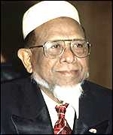
Abdus Samad Azad was a Bangladeshi diplomat and politician. He was elected to Bangladesh's parliament five times from 1970 to 2001. He was also elected Member of Lower Assembly in the Parliament of the then East Pakistan. He became President of the Muslim Student Federation of All - Asam in 1946 and led the Language Movement in 1952.
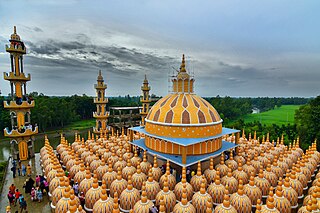
Tangail is a district (zila) in the central region of Bangladesh. In 1969, Tangail district was created by Tangail Mohokuma from its 237 square kilometers of land and 3177 square kilometers of land acquired from Mymensingh district. It is the largest district of Dhaka division by area and second largest by population. The population of Tangail zila is about 4 million and its area is 3,414.28 square kilometres (1,318.26 sq mi). The main city of the district is Tangail. It is surrounded by Jamalpur District on the north, the Dhaka and Manikganj Districts on the south, Mymensingh and Gazipur on the east, and Sirajganj on the west.
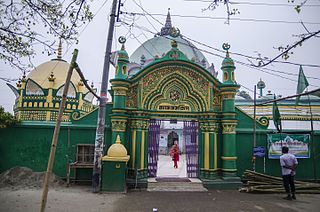
Sirajganj District is a district in the North Bengal region of Bangladesh, located in the Rajshahi Division. It is the 25th largest district by area and 9th largest district by population in Bangladesh. It is known as the gateway to North Bengal.

The Daily Ittefaq is a Bengali-language daily newspaper. Founded in 1949 by Maulana Bhashani and Yar Mohammad Khan, it is the oldest newspaper, and one of the most circulated newspapers in Bangladesh. The newspaper format is Broadsheet and it is printed by Ittefaq Group of Publications Limited.

Syed Mujtaba Ali was a Bengali writer, journalist, travel enthusiast, academic, scholar and linguist. He lived in Bangladesh, India, Germany, Afghanistan and Egypt.
Mohammad Toaha was a language activist of the 1952 language movement and a prominent left-wing politician from Bangladesh.
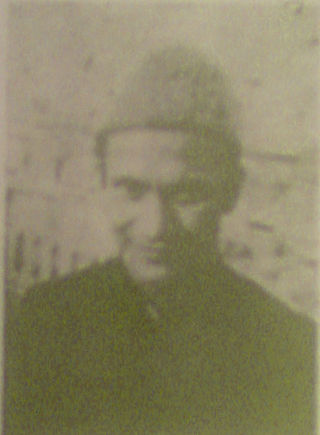
Shamsul Huq (1918–1965) was a Pakistani Bengali politician who led a parliamentary committee in the Constituent Assembly of Pakistan to advocate for the recognition of the Bengali language during the Language movement of the 1950s. He was also the first and third general secretary of the Awami League, which played a key role in Bengali nationalist movement in the 1950s and 1960s.
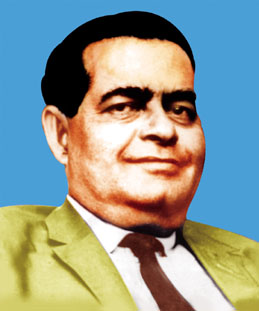
Tofazzal Hossain, popularly known as Manik Miah, was a Pakistani Bengali journalist and politician. He served as the founding editor of The Daily Ittefaq. He wrote the editorial Rajnoitik Moncho. Most of his newspaper's journalists were considered leftist, as Miah followed the pattern of Awami League. According to journalist and editor of Shongbad Bozlur Rahman, Awami activists followed his editorial more than any actual decision of a meeting. He was a close associate of the founder of Bangladesh, Sheikh Mujibur Rahman.

Mawlana Bhashani Science and Technology University (MBSTU) is the 12th oldest public university and second science and technology specialized PhD granting public university in Bangladesh. It is named after the political leader Mawlana Abdul Hamid Khan Bhashani. The medium of instruction is English. Every year, 925 students are enrolled in undergraduate programs at the university, and there are around 243 teachers. In 2021, MBSTU was ranked as the top research university in Bangladesh by Scopus-SCImago institution ranking. In 2020, MBSTU was ranked first among all the universities of Bangladesh by Scimago Institutions Rankings.
1976 (MCMLXXVI) was a leap year starting on Thursday of the Gregorian calendar, the 1976th year of the Common Era (CE) and Anno Domini (AD) designations, the 976th year of the 2nd millennium, the 76th year of the 20th century, and the 7th year of the 1970s decade.
Hajee Mohammad Danesh was a Bangladeshi politician and communist activist born in the British India.

Abdul Hamid Khan Bhashani, often shortened as Maulana Bhashani, was a Bengali politician. His political tenure spanned the British colonial India, Pakistan and Bangladesh periods. Maulana Bhashani was popularly known by the honorary title Mozlum Jananeta for his lifelong stance advocating for the poor. He gained nationwide mass popularity among the peasants and helped to build the East Pakistan Peasant Association. Owing to his political leaning to the left, often dubbed Islamic Socialism, he was also called 'The Red Maulana'. He is considered as one of the main pillars of Bangladeshi independence (1971).
Yar Mohammad Khan was one of the founders and the first treasurer of the Bangladesh Awami League, the main political party that eventually led Bangladesh's struggle for independence against the West Pakistan regime.

The All-Pakistan Awami League was a Pakistani political party founded by Huseyn Shaheed Suhrawardy in February 1950. Pir of Manki Sharif and Khan Ghulam Mohammad Khan from the North-West Frontier Province (NWFP) joined it soon afterwards.
The non-cooperation movement of 1971 was a historical movement in then East Pakistan by the Awami League and the general public against the military government of Pakistan in March of that year. After the announcement of the suspension of the session of the National Assembly of Pakistan on 1 March, the spontaneous movement of the people started, but officially on the call of Sheikh Mujibur Rahman, the non-cooperation movement started on 2 March and continued until 25 March. The movement lasted for a total of 25 days.
Wajed Ali Khan Panni was a Bengali politician, educationist and the zamindar of Karatia.
Kagmari Conference was a historic council meeting of Awami League that called for autonomy for East Pakistan and created the path for the Independence of Bangladesh.
Hatem Ali Talukdar was a Bangladesh Awami League politician and the former member of parliament for Tangail-2.











